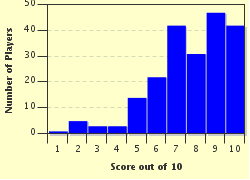Quiz Answer Key and Fun Facts
1. 'For they shall see eye to eye' is a common saying found in the KJV Bible in Isaiah 52:8. Complete the missing word from the passage: "Thy watchmen shall lift up the voice; with the voice together shall they _______: for they shall see eye to eye, when the LORD shall bring again Zion."
2. 'A house divided among itself cannot stand' is another common expression coming from the Bible, with Jesus using words to that effect in Matthew 12:25 in both the KJV and the NIV Bibles. According to Scripture, Jesus used the phrase just after curing a demon-possessed man who was blind and mute. Some people, however, were indignant about the healing. To whom was Jesus speaking when he used the phrase 'every city or household divided against itself will not stand?'
3. A common expression in the New Testament is 'the bread of life' with the words appearing in John 6:35 in both the KJV and NIV Bibles. Who described himself as 'the bread of life' in this passage?
4. 'Lamb to the slaughter' is a common expression that appears in an Old Testament book written by one of the major prophets. What's the name of the book?
5. The common saying 'good Samaritan' comes from a parable told by Jesus in the New Testament. The parable has become known as the Good Samaritan and in a nutshell, the parable tells of a man who is robbed, severely beaten and left for dead along the side of a road. Scripture states a priest and a Levite passed by the man, even though he was desperately in need of help. However, a Samaritan stopped and helped the man. The parable of the Good Samaritan appears in only one book in the Bible. Can you name it?
6. 'In the twinkling of an eye' is a common expression that appears in one of the New Testament books Paul is credited with writing. Can you name the book?
7. 'Blessed are the peacemakers' is a common expression used by Jesus in Matthew 5:9. What was the occasion in which he used the term?
8. 'To everything there is a season' is a common expression that appears in Ecclesiastes 3:1 in the Old Testament. Much of the third chapter of Ecclesiastes was set to music in 1959 by Pete Seger and in 1965 a musical group released a rendition of the song titled "Turn, Turn Turn (to Everything There is a Season)". The song quickly became an international hit. What's the name of the group that made the song a giant hit?
9. 'A thorn in the flesh' is a common expression that appears in 2 Corinthians 12:7. In the NIV Bible, the writer of the book states he was given a 'thorn in the flesh' so he would not become conceited. Who is credited with writing 2 Corinthians?
10. Another common saying that comes from the Bible is 'it's better to give than to receive,' as per Acts 20:35 in both the NIV and KJV. Acts is credited with being written by Luke and the passage in question quotes Paul as using the common expression. However, in the same passage, who does Paul say originally used the expression?
Source: Author
Cowrofl
This quiz was reviewed by FunTrivia editor
CellarDoor before going online.
Any errors found in FunTrivia content are routinely corrected through our feedback system.

